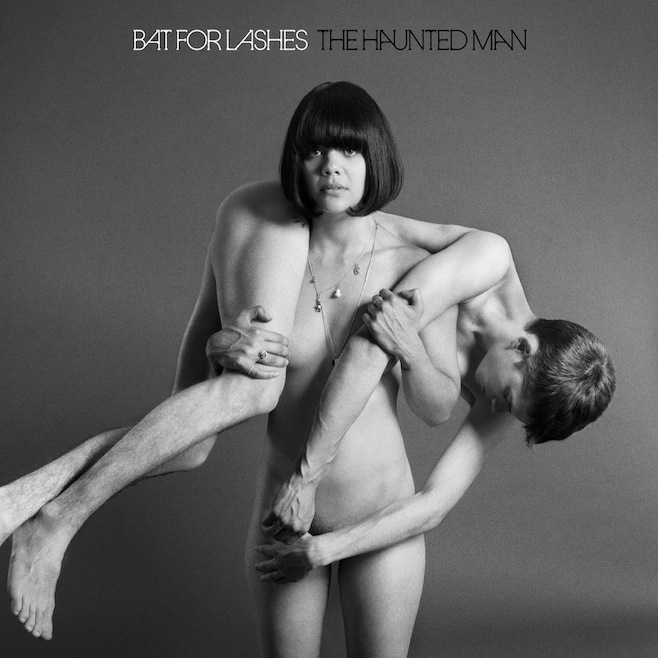“Still I’m holding out my hand/ Standing by my haunted man”
Natasha Khan isn’t playing it close to the chest. On the third studio release from the mastermind behind Bat For Lashes, she’s titled the album The Haunted Man, leaving little to the imagination. But the imagination contained within Khan’s heartbreak minutiae reveals a genius tied to a stake of her own making, burning as a witch who won’t stop summoning her own demons.
Although the record’s opening track “Lillies” hints at golden, delicate-petaled hope, her dreams simply aren’t nurtured enough to open to the sun. Optimism seems to bloom within the elegant horns at the fringes of the song, but aching metaphors are buried in her croons. The record is punctuated by Khan’s decidedly relational perspective and her staccato heart, that despairs endlessly over ghosts only to exalt, later, in the ability to feel that deeply at all.
Khan isn’t defeated–she’s simply resigned to her fate. She’s in love with a ghost, a haunted twisted mess of a man, but her faceted heart works as a prism, reflecting the light of this situation into multi-colored variations on a theme. Instead of feeling tired or sick like Taylor Swift’s spilled ice cream cone style woes, the songs on The Haunted Man fit like sumptuous nightgowns. The songs are expensive in their depth of emotion but comforting in their intimacy and alluring appeal.
Take title track “Haunted Man” or the pseudo-peppy beat of “A Wall.” Khan isn’t singing about hurt pride or bad dating experiences. She vocalizes what it feels like to actually hand over your heart to another human being. I had the pleasure of sitting down with Natasha earlier this fall, and she shared with me that the male choir singing on the title track is a recording of the echo of the music back across a canyon in Northern Italy. How clearly we hear this echo serves as the perfect musical symbol for the record, how clearly we see the object of Natasha’s affections through her songs about him.
“Deep Sea Diver” encapsulates a drowning feeling–the high-tide moment of happiness, that endlessly abates to low tide, darker waters, lack of oxygen. “Rest Your Head” alludes to this too–her desperation to offer some respite–to serve even as protection or pillow. The silken yarns of tracks “Laura” and “Marilyn” exemplify her empathy for women struggling with their own pallid apparitions, but her gaze doesn’t waver from her own specter for very long. The highlight of the record comes in “Oh Yeah,” with a dice-throw of male vocalists echoing “Oh Yeah” behind Natasha’s knife-like wielding of the word “hope,” an endless weapon against her phantom love. The alternating assertions of “I am hope/ Here am I” as stanza beginners situate Natasha within the meshwork of her unwavering sunrise of faith in her unsteady beloved.
It would be a disservice to neglect the musicianship embroidered with needling insistency throughout The Haunted Man. Buoyed by collaborations with the likes of Beck, Dave Sitek and Rob Ellis, the sonic-boom feel of songs as delicate and storied as old lace is a marriage that won’t soon be shaken. If Khan’s last two albums were tapestries, this one is a prayer book, adorned with pictures of the exalted, stained with tears, and almost too personal for the eyes of strangers to look upon. Her amalgam of ethereal strings and electronic noise speaks to the pairing of unlikely elements and their eventual need for one another. Combining the stateliness of reedy wind instruments, dramatic strings and horns with fuzzed out synths brings an alien strangeness to the record that is engrossing, but explorable through her ever-present, all too human, mooning heartbreak.
Natasha can’t let go, and as we listen to The Haunted Man, neither can we. There’s too much majesty in this tragedy, too much treasure invested in a decaying vessel. If we look even closer it becomes apparent that the treasure is Natasha herself. Even as she pours herself out pleading the case for other women, even as she bats at the ghosts that haunt her, even as she sits by the sea and dreams. She may be wounded, robbed of all her gold, but she’s the one with enough strength to keep standing, even with the burden of her wounded love heavy on her shoulders, no end in sight. With the brazen pride of a Greek myth, Natasha may win her victory simply by refusing to give up the fight. Or she may chain herself to an endless task, pushing the boulder of love next to Sisyphus for eternity. Either way, she’s taken a large risk that has turned into a tremendous work of art.


